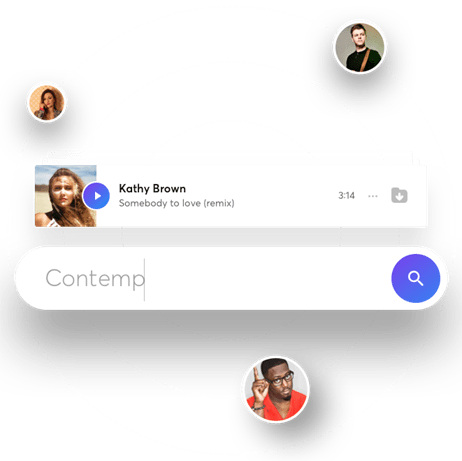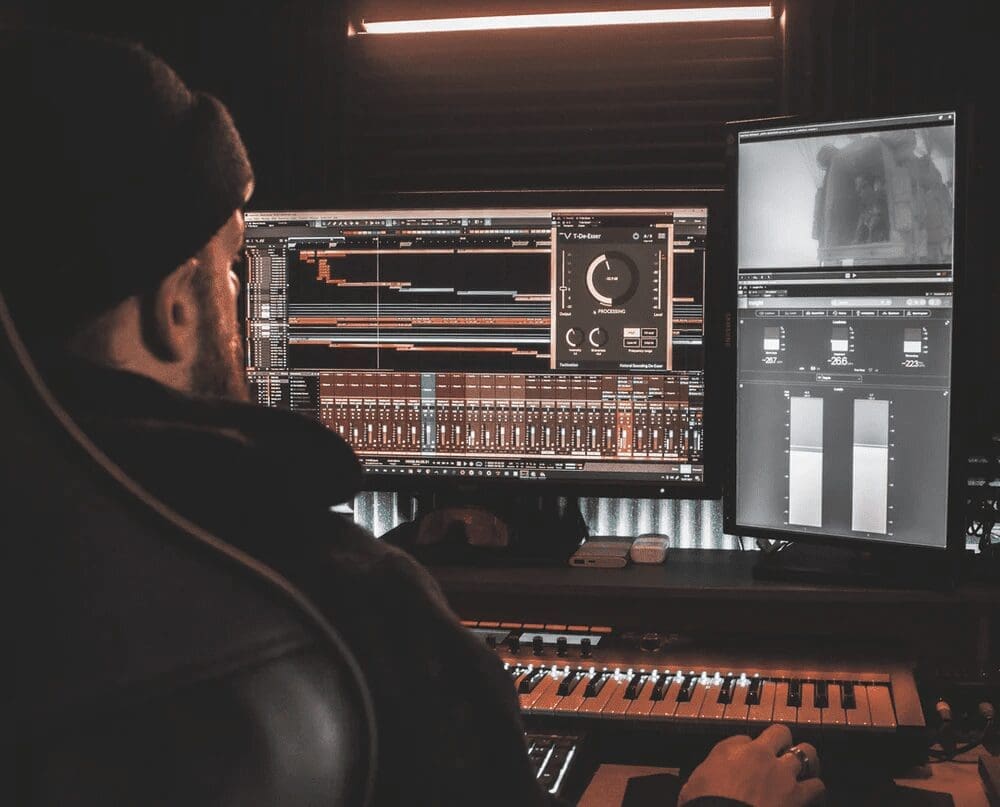Who We Work With
Working to perfectly match music with video to create powerful, engaging and entertaining content. Indie music from filmmakers and beyond.












Working to perfectly match music with video to create powerful, engaging and entertaining content. Indie music from filmmakers and beyond.













Our sync licensing music library has thousands of one-stop tracks available for quick and easy music licensing no matter the project.
Our creative team knows the catalogue inside out and can quickly create a custom playlist of options for you to stream based on your creative needs and budgetary requirements, for free!


We understand music licensing fees can be hard to navigate and it’s really easy to license free music and royalty free music. Our model ensures you raise your game with your audio, support the music industry and makes for easy song licensing all at the same time.

Please get in touch, we would love to discuss your project and see how we can help.

Are you a new music supervisor or someone just looking for the perfect song for your project? Perhaps you’re an artist wanting a career in the world of sync. Before any of that can happen, you first need to understand the world of sync licensing. It’s important to know all about the best music libraries for film and TV, how to license music for short film, what open license music is, licensing for music production & more. Let us shed some light on music library licensing, production music licensing, music libraries for sync licensing and more.
In its simplest form, sync licensing is paring music with film, radio, TV or any other possible type of media. Content producers (filmmakers, etc.) need music to create an atmosphere or a specific emotion. Imagine watching a film with no music – it wouldn’t have the same impact. A music placement in any form of production can reward an artist with both exposure, high sync license fees and performance royalties.
A sync licensing music library is the first place a music supervisor will look when pairing music for televised, gaming or audio production. Sync licensing libraries are vaults of music for every mood and production requirement.
In order to use a piece of music with your media, music supervisors first need to secure a music license with the copyright owner. This allows the right to place the chosen music on TV, film or radio. From a standard license to master recording and creative commons licenses – it is important that the music, tracks and sound effects you use are properly licensed.

You may be wondering how to license music for a film, but before you dive into obtaining licensing agreements for music, you first need to understand the two types of music rights holders involved.
The Songwriter – The songwriter/copyright holder is the composer and lyricist of a piece of music. This can be one person or a group of people, all holding a percentage split of the copyright.
The Master Rights Holder – A master rights holder is the person (or company) that owns the rights to a recording of a piece of music. The master rights holder is the person or company who funded the recording process of that particular song or album.
If you’re a signed artist, your record label will own the rights to your recordings. Note that a master rights holder only owns the rights to the recording they funded. If you have two recordings of the same song, funded by different entities, both recordings will have separate rights holders.
One Stop – A ‘one stop’ is a term used in the sync world for a person that owns both the songwriting and the master rights to a piece of music. One stops are easier to license due to the singular point of contact.
Once a piece of music works has been chosen for media, the creator must then obtain a license to place it. There are four main types of licenses:
Sync License – A synchronisation license allows for a piece of music to be used in conjunction with other media. This must always be obtained when wanting to license music for video or other media. Music
Master Recording License – A master recording license gives the right to use a specific sound recording. This does not always need to be obtained. If only a sync license can be obtained, a cover recording can be created – this often makes the licensing cheaper.
Mechanical License – A mechanical license allows for copies of the media containing licensed music to be made. This is needed for the production of CDs, DVDs, etc.
Performance License – A performance license allows media to broadcast music to the public. This is needed if music is placed in radio or TV commercials – performances of musical work/ public performance.
All of these licenses can be obtained either through speaking with a ‘one stop’ or by contacting an artists publisher, performing rights organizations (PRO) or a music licensing company like PRS for Music or PPL/PRS combined.
A PPL licenses the use of recorded music on behalf of record companies and performers when it is played in public, used anywhere on the internet or broadcast on radio or TV.
A licence from PRS for Music covers the majority of copyright music being played, with some exceptions including music which is out of copyright.

Library music, also known as stock music, is a fantastic easy-to-find way for media creators to source music for films, TV and radio. Using a TV film music library is a cheaper alternative to placing hit songs on your media and is much easier to obtain licenses as music is ‘ready to go’. Just one piece of library music can have multiple versions: Full track, instrumental, music bed – all of which can be synced. Some library music can even be royalty-free!
All of this music needs a place to be stored so media creators can easily find their desired song. That’s where a music library comes into play. Stock music libraries and sync libraries work in much the same way as your iCloud music library does – only on a monumental scale. It’s important that music supervisors have a broad knowledge of music past and present, in order to negotiate the vast annals of a sync music library. Music supervisors will have an extensive network and have access to the top music libraries for tv & film placements.
A music library directory, music licensing directory, sync libraries, or music licensing library, are all a collection of music from all styles and backgrounds for the purpose of music synchronisation. Every song or instrumental stored in a music library database is encoded with metadata for easy categorisation which can be used by supervisors to locate that perfect track.

Music library companies will have huge production music libraries for the purpose of sync. Once a piece has been selected, supervisors can easily obtain the required licences through the licensing company that works on behalf of the artist. Read about Music Gateway’s music library here.
Some music libraries list, like the YouTube music library, offer royalty-free music for use in media. Free music libraries or a free music archive are a great way of placing music on a budget as most provide copyright-free music – with no licenses needed! There are plenty of free music websites out there. Simply search ‘free music for videos in Google.
Not everyone has huge a budget when it comes to song licensing. So the best way to find those killer tracks for your latest film without busting the bank or making a copyright infringement is to use royalty free stock music.
Royalty-free doesn’t necessarily mean the music will come for free. You may still have to pay for the licensing. However, this does mean that you won’t have to pay out every time your media is aired and you’re not using copyrighted music illegally… Imagine you’re a small business creating an advert for TV – you don’t have the budget to pay out royalties every time your ad is aired. Royalty-free music would be the perfect solution.
Royalty-free doesn’t mean poor quality either, it just means you’re not breaking copyright law. There are countless music libraries out there that make incredible quality original music, all waiting to be placed in your media! Play recorded music worry-free Are you needing easy music licensing for film or other media outlets in the UK, the US or worldwide? Check out Music Gateway’s licensing services here.
Read our success stories for Music Gateway Sync or check out our Music Distribution.

How do I get a music license?
Synchronization licenses or ‘Music Licensing’ are custom-negotiated directly with the copyright holder upfront and can be quite complex. You can attempt to locate the copyright owners yourself and request permission.
What types of music licenses are there?
There are six different types of licenses:
Who needs a music license?
Anyone who wishes to use a copyrighted song in any type of media, such as TV, film or their own music, requires a license. Sync licenses are needed for audio-visual products whereas mechanical licenses are needed for audio-only only products.
How much does a music license cost?
There is no set cost for a music license. The cost of licensing a famous song can vary quite a bit. If it is a song by a small independent artist, the cost of a license could be between $50 (£35) and $150 (£105).